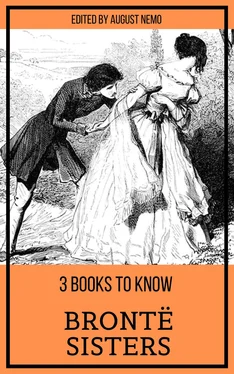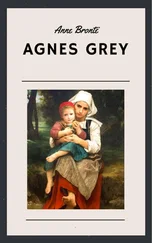‘Well, then, what makes you so cross? Come here, Milly, and tell me why you can’t be satisfied with my assurance.’
She went, and putting her little hand within his arm, looked up in his face, and said softly,—
‘What does it amount to, Ralph? Only to this, that though you admire Annabella so much, and for qualities that I don’t possess, you would still rather have me than her for your wife, which merely proves that you don’t think it necessary to love your wife; you are satisfied if she can keep your house, and take care of your child. But I’m not cross; I’m only sorry; for,’ added she, in a low, tremulous accent, withdrawing her hand from his arm, and bending her looks on the rug, ‘if you don’t love me, you don’t, and it can’t be helped.’
‘Very true; but who told you I didn’t? Did I say I loved Annabella?’
‘You said you adored her.’
‘True, but adoration isn’t love. I adore Annabella, but I don’t love her; and I love thee, Milicent, but I don’t adore thee.’ In proof of his affection, he clutched a handful of her light brown ringlets, and appeared to twist them unmercifully.
‘Do you really, Ralph?’ murmured she, with a faint smile beaming through her tears, just putting up her hand to his, in token that he pulled rather too hard.
‘To be sure I do,’ responded he: ‘only you bother me rather, sometimes.’
‘I bother you!’ cried she, in very natural surprise.
‘Yes, you—but only by your exceeding goodness. When a boy has been eating raisins and sugar-plums all day, he longs for a squeeze of sour orange by way of a change. And did you never, Milly, observe the sands on the sea-shore; how nice and smooth they look, and how soft and easy they feel to the foot? But if you plod along, for half an hour, over this soft, easy carpet—giving way at every step, yielding the more the harder you press,—you’ll find it rather wearisome work, and be glad enough to come to a bit of good, firm rock, that won’t budge an inch whether you stand, walk, or stamp upon it; and, though it be hard as the nether millstone, you’ll find it the easier footing after all.’
‘I know what you mean, Ralph,’ said she, nervously playing with her watchguard and tracing the figure on the rug with the point of her tiny foot—‘I know what you mean: but I thought you always liked to be yielded to, and I can’t alter now.’
‘I do like it,’ replied he, bringing her to him by another tug at her hair. ‘You mustn’t mind my talk, Milly. A man must have something to grumble about; and if he can’t complain that his wife harries him to death with her perversity and ill-humour, he must complain that she wears him out with her kindness and gentleness.’
‘But why complain at all, unless because you are tired and dissatisfied?’
‘To excuse my own failings, to be sure. Do you think I’ll bear all the burden of my sins on my own shoulders, as long as there’s another ready to help me, with none of her own to carry?’
‘There is no such one on earth,’ said she seriously; and then, taking his hand from her head, she kissed it with an air of genuine devotion, and tripped away to the door.
‘What now?’ said he. ‘Where are you going?’
‘To tidy my hair,’ she answered, smiling through her disordered locks; ‘you’ve made it all come down.’
‘Off with you then!—An excellent little woman,’ he remarked when she was gone, ‘but a thought too soft—she almost melts in one’s hands. I positively think I ill-use her sometimes, when I’ve taken too much—but I can’t help it, for she never complains, either at the time or after. I suppose she doesn’t mind it.’
‘I can enlighten you on that subject, Mr. Hattersley,’ said I: ‘she does mind it; and some other things she minds still more, which yet you may never hear her complain of.’
‘How do you know?—does she complain to you?’ demanded he, with a sudden spark of fury ready to burst into a flame if I should answer “yes.”
‘No,’ I replied; ‘but I have known her longer and studied her more closely than you have done.—And I can tell you, Mr. Hattersley, that Milicent loves you more than you deserve, and that you have it in your power to make her very happy, instead of which you are her evil genius, and, I will venture to say, there is not a single day passes in which you do not inflict upon her some pang that you might spare her if you would.’
‘Well—it’s not my fault,’ said he, gazing carelessly up at the ceiling and plunging his hands into his pockets: ‘if my ongoings don’t suit her, she should tell me so.’
‘Is she not exactly the wife you wanted? Did you not tell Mr. Huntingdon you must have one that would submit to anything without a murmur, and never blame you, whatever you did?’
‘True, but we shouldn’t always have what we want: it spoils the best of us, doesn’t it? How can I help playing the deuce when I see it’s all one to her whether I behave like a Christian or like a scoundrel, such as nature made me? and how can I help teasing her when she’s so invitingly meek and mim, when she lies down like a spaniel at my feet and never so much as squeaks to tell me that’s enough?’
‘If you are a tyrant by nature, the temptation is strong, I allow; but no generous mind delights to oppress the weak, but rather to cherish and protect.’
‘I don’t oppress her; but it’s so confounded flat to be always cherishing and protecting; and then, how can I tell that I am oppressing her when she “melts away and makes no sign”? I sometimes think she has no feeling at all; and then I go on till she cries, and that satisfies me.’
‘Then you do delight to oppress her?’
‘I don’t, I tell you! only when I’m in a bad humour, or a particularly good one, and want to afflict for the pleasure of comforting; or when she looks flat and wants shaking up a bit. And sometimes she provokes me by crying for nothing, and won’t tell me what it’s for; and then, I allow, it enrages me past bearing, especially when I’m not my own man.’
‘As is no doubt generally the case on such occasions,’ said I. ‘But in future, Mr. Hattersley, when you see her looking flat, or crying for “nothing” (as you call it), ascribe it all to yourself: be assured it is something you have done amiss, or your general misconduct, that distresses her.’
‘I don’t believe it. If it were, she should tell me so: I don’t like that way of moping and fretting in silence, and saying nothing: it’s not honest. How can she expect me to mend my ways at that rate?’
‘Perhaps she gives you credit for having more sense than you possess, and deludes herself with the hope that you will one day see your own errors and repair them, if left to your own reflection.’
‘None of your sneers, Mrs. Huntingdon. I have the sense to see that I’m not always quite correct, but sometimes I think that’s no great matter, as long as I injure nobody but myself—’
‘It is a great matter,’ interrupted I, ‘both to yourself (as you will hereafter find to your cost) and to all connected with you, most especially your wife. But, indeed, it is nonsense to talk about injuring no one but yourself: it is impossible to injure yourself, especially by such acts as we allude to, without injuring hundreds, if not thousands, besides, in a greater or less, degree, either by the evil you do or the good you leave undone.’ ‘And as I was saying,’ continued he, ‘or would have said if you hadn’t taken me up so short, I sometimes think I should do better if I were joined to one that would always remind me when I was wrong, and give me a motive for doing good and eschewing evil, by decidedly showing her approval of the one and disapproval of the other.’
Читать дальше











